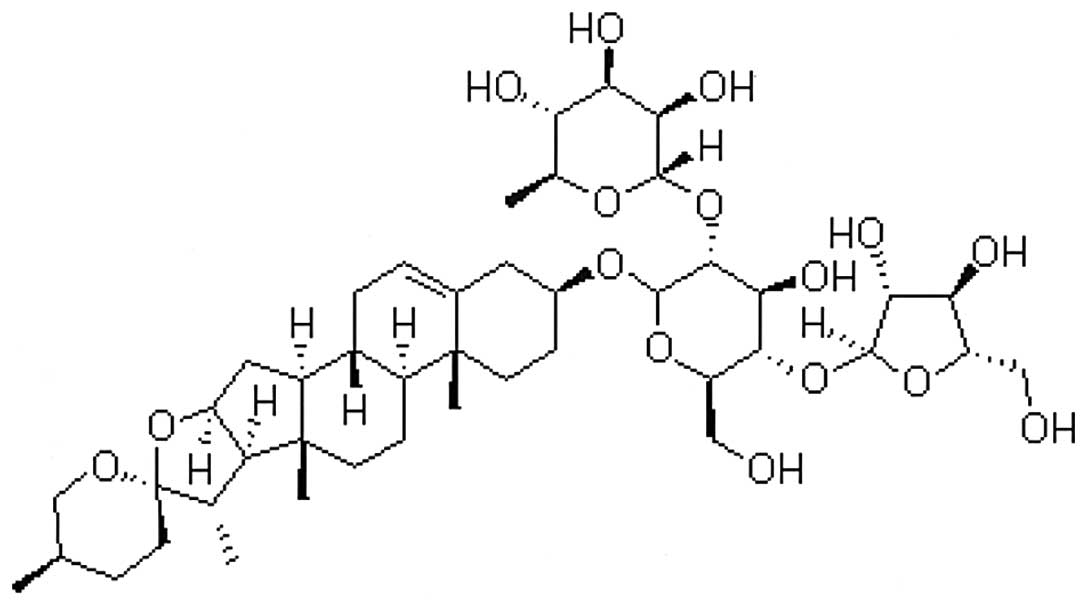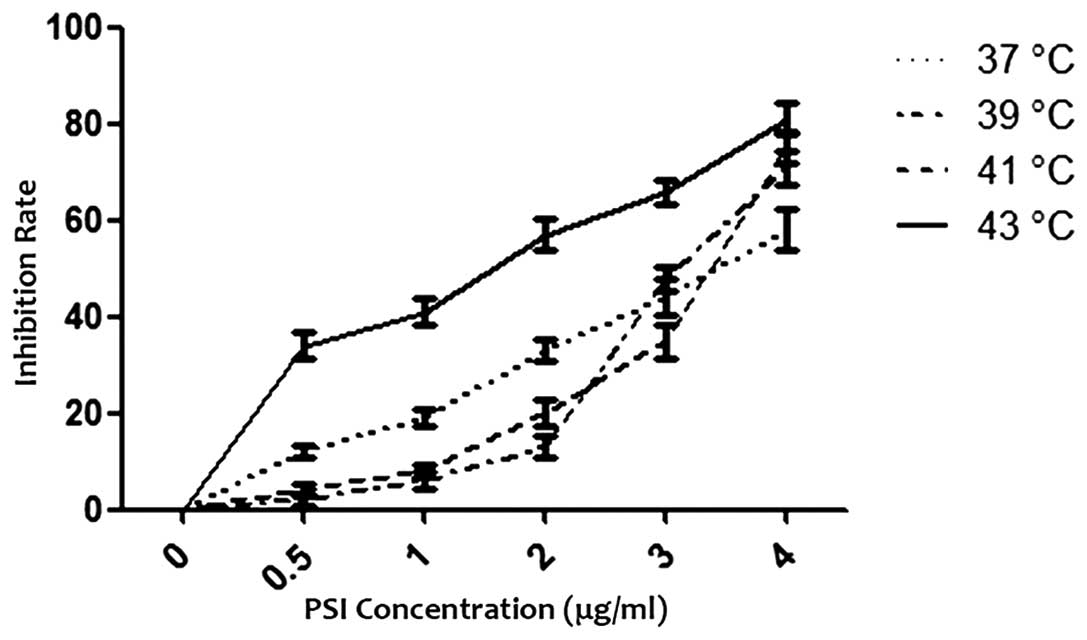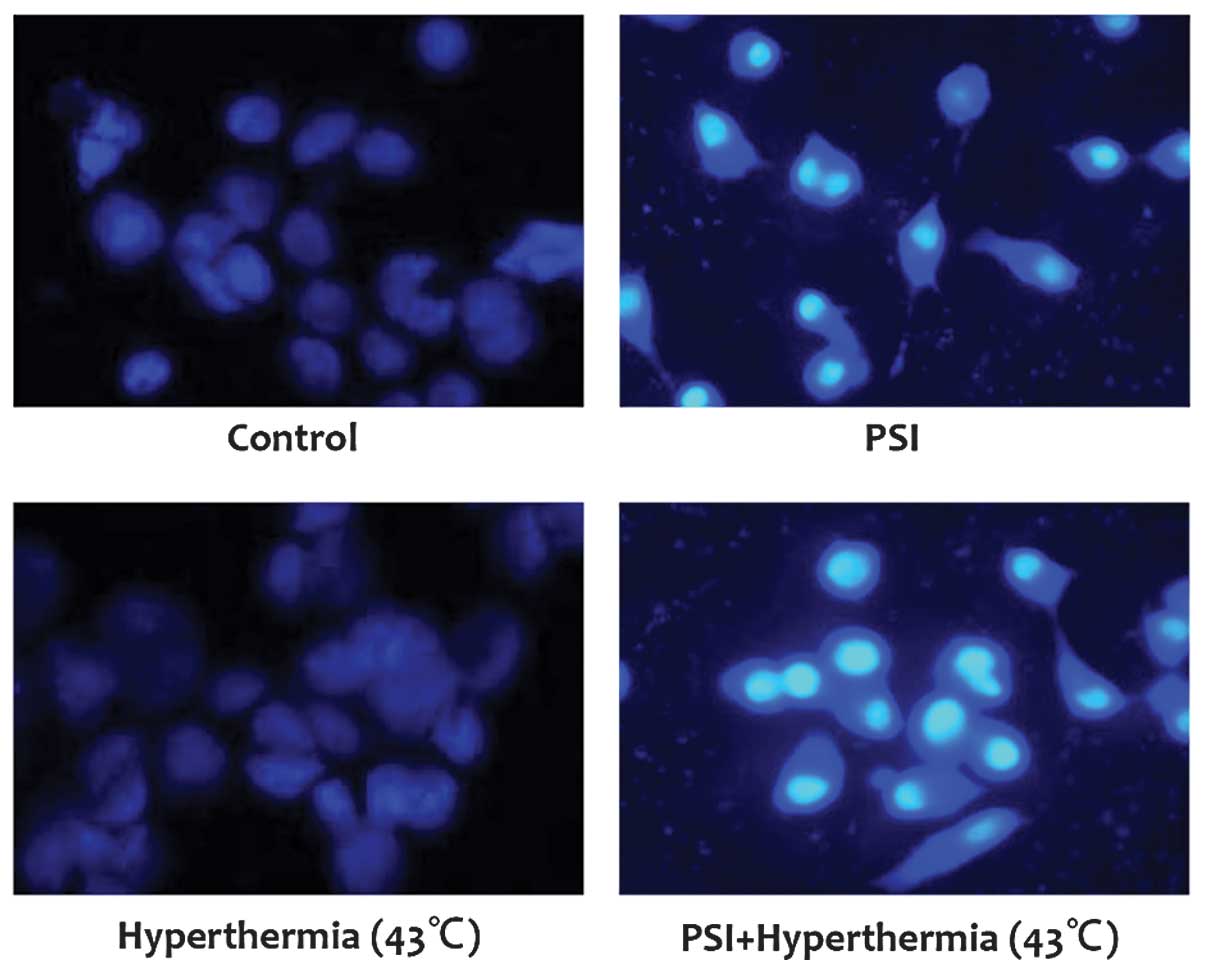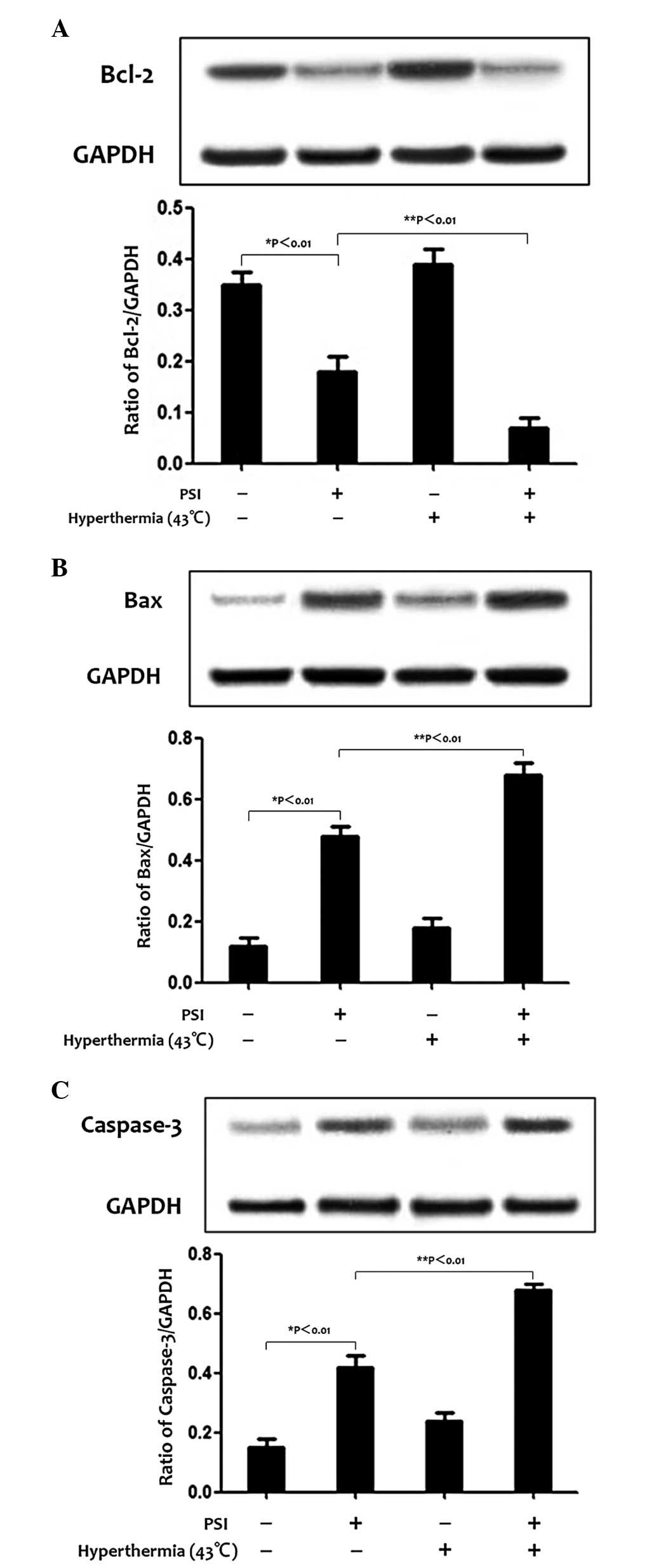|
1
|
Sher T, Dy GK and Adjei AA: Small cell
lung cancer. Mayo Clin Proc. 83:355–367. 2008. View Article : Google Scholar
|
|
2
|
Schiller JH, Harrington D, Belani CP,
Langer C, Sandler A, Krook J, Zhu J and Johnson DH; Eastern
Cooperative Oncology Group. Comparison of four chemotherapy
regimens for advanced non-small-cell lung cancer. N Engl J Med.
346:92–98. 2002. View Article : Google Scholar
|
|
3
|
Wang SL, Zhao YL, Li X, Li Y and Li H:
Study on amyloid and colloidal Paris polyphylla var. yunnanensis.
Acta Botanica Yunnanica. 18:345–348. 1996.
|
|
4
|
Chen CX, Nagasawa J and Zhou H: Two minor
steroidal saponins from the aerial parts of Paris polyphylla var.
yunnanensis. Acta Botanica Yunnanica. 17:215–220. 2001.
|
|
5
|
Matsuda H, Pongpiriyadacha Y, Morikawa T,
Kishi A, Kataoka S and Yoshikawa M: Protective effects of steroid
saponins from Paris polyphylla var. yunnanensis on ethanol- or
indomethacin-induced gastric mucosal lesions in rats: structural
requirement for activity and mode of action. Bioorg Med Chem Lett.
13:1101–1106. 2003. View Article : Google Scholar
|
|
6
|
Jin WD, Chen XP and Cai HJ: In vitro
cytotoxicity of Paridis extract on HepG2 cells. J Huazhong Univ Sci
Tech Med Sci. 35:103–106. 2006.
|
|
7
|
Sun J, Liu BR, Hu WJ, Yu LX and Qian XP:
In vitro anticancer activity of aqueous extracts and ethanol
extracts of fifteen traditional Chinese medicines on human
digestive tumor cell lines. Phytother Res. 21:1102–1104. 2007.
View Article : Google Scholar
|
|
8
|
Lee MS, Yuet-Wa JC, Kong SK, Yu B,
Eng-Choon VO, Nai-Ching HW, Chung-Wai TM and Fung KP: Effects of
polyphyllin D, a steroidal saponin in Paris polyphylla, in growth
inhibition of human breast cancer cells and in xenograft. Cancer
Biol Ther. 4:1248–1254. 2005. View Article : Google Scholar : PubMed/NCBI
|
|
9
|
Cheung JY, Ong RC, Suen YK, Ooi V, Wong
HN, Mak TC, Fung KP, Yu B and Kong SK: Polyphyllin D is a potent
apoptosis inducer in drug-resistant HepG2 cells. Cancer Lett.
217:203–211. 2005. View Article : Google Scholar : PubMed/NCBI
|
|
10
|
Deng S, Yu B, Hui Y, Yu H and Han X:
Synthesis of three diosgenyl saponins: dioscin, polyphyllin D, and
balanitin 7. Carbohydr Res. 317:53–62. 1999. View Article : Google Scholar : PubMed/NCBI
|
|
11
|
Li B, Yu B, Hui Y, Li M, Han X and Fung
KP: An improved synthesis of the saponin, polyphyllin D. Carbohydr
Res. 331:1–7. 2001. View Article : Google Scholar : PubMed/NCBI
|
|
12
|
Siu FM, Ma DL, Cheung YW, Lok CN, Yan K,
Yang Z, Yang M, Xu S, Ko BC, He QY and Che CM: Proteomic and
transcriptomic study on the action of a cytotoxic saponin
(Polyphyllin D): induction of endoplasmic reticulum stress and
mitochondria-mediated apoptotic pathways. Proteomics. 8:3105–3117.
2008. View Article : Google Scholar
|
|
13
|
Chan JY, Koon JC, Liu X, Detmar M, Yu B,
Kong SK and Fung KP: Polyphyllin D, a steroidal saponin from Paris
polyphylla, inhibits endothelial cell functions in vitro and
angiogenesis in zebra fish embryos in vivo. J Ethnopharmacol.
137:64–69. 2011. View Article : Google Scholar : PubMed/NCBI
|
|
14
|
Rose CYO, Jenny YNC, Henry NCW, Thomas
CWM, Kong SK, Yu B and Fung KP: Saponin Polyphyllin D induced
apoptosis in human hepatocellular carcinoma and multidrug resistant
liver cancer cells. Proc Amer Assoc Cancer Res. 45:29792004.
|
|
15
|
Ma DD, Lu HX, Xu LS and Xiao W:
Polyphyllin D exerts potent anti-tumour effects on Lewis cancer
cells under hypoxic conditions. J Int Med Res. 37:631–640. 2009.
View Article : Google Scholar : PubMed/NCBI
|
|
16
|
Xiao X and Bai P: The antitumoral effect
of Paris Saponin I associated with the induction of apoptosis
through the mitochondrial pathway. Mol Cancer Ther. 8:1179–1188.
2009. View Article : Google Scholar : PubMed/NCBI
|
|
17
|
van der Zee J, González González D, van
Rhoon GC, van Dijk JD, van Putten WL and Hart AA: Comparison of
radiotherapy alone with radiotherapy plus hyperthermia in locally
advanced pelvic tumours: a prospective, randomised, multicentre
trial. Dutch Deep Hyperthermia Group. Lancet. 355:1119–1125.
2000.
|
|
18
|
Jones EL, Samulski TV, Dewhirst MW,
Alvarez-Secord A, Berchuck A, Clarke-Pearson D, Havrilesky LJ,
Soper J and Prosnitz LR: A pilot Phase II trial of concurrent
radiotherapy, chemotherapy, and hyperthermia for locally advanced
cervical carcinoma. Cancer. 98:277–282. 2003. View Article : Google Scholar
|
|
19
|
Sakurai H, Kitamoto Y, Saitoh J, Nonaka T,
Ishikawa H, Kiyohara H, Shioya M, Fukushima M, Akimoto T, Hasegawa
M and Nakano T: Attenuation of chronic thermotolerance by KNK437, a
benzylidene lactam compound, enhances thermal radiosensitization in
mild temperature hyperthermia combined with low dose-rate
irradiation. Int J Radiat Biol. 81:711–718. 2005. View Article : Google Scholar
|
|
20
|
Han SI, Duong HQ, Choi JE, Lee TB, Kim CH,
Lee SY, Jeon HM, Shin SH, Lim SC and Kang HS: Hyperthermia switches
glucose depletion-induced necrosis to apoptosis in A549 lung
adenocarcinoma cells. Int J Oncol. 32:851–860. 2008.PubMed/NCBI
|
|
21
|
Coss RA and Linnemans WA: The effects of
hyperthermia on the cytoskeleton: a review. Int J Hyperthermia.
12:173–196. 1996. View Article : Google Scholar : PubMed/NCBI
|
|
22
|
Wachsberger PR and Iliakis G: Hyperthermia
does not affect rejoining of DNA double-strand breaks in a
cell-free assay. Int J Radiat Biol. 76:313–326. 2000. View Article : Google Scholar : PubMed/NCBI
|
|
23
|
Luchetti F, Mannello F, Canonico B,
Battistelli M, Burattini S, Falcieri E and Papa S: Integrin and
cytoskeleton behaviour in human neuroblastoma cells during
hyperthermia-related apoptosis. Apoptosis. 9:635–648. 2004.
View Article : Google Scholar
|
|
24
|
Song CW, Shakil A, Osborn JL and Iwata K:
Tumour oxygenation is increased by hyperthermia at mild
temperatures. Int J Hyperthermia. 12:367–373. 1996. View Article : Google Scholar : PubMed/NCBI
|
|
25
|
Kong G, Anyarambhatla G, Petros WP, Braun
RD, Colvin OM, Needham D and Dewhirst MW: Efficacy of liposomes and
hyperthermia in a human tumor xenograft model: importance of
triggered drug release. Cancer Res. 60:6950–6957. 2000.PubMed/NCBI
|
|
26
|
Milani V, Noessner E, Ghose S, Kuppner M,
Ahrens B, Scharner A, Gastpar R and Issels RD: Heat shock protein
70: role in antigen presentation and immune stimulation. Int J
Hyperthermia. 18:563–575. 2002.PubMed/NCBI
|
|
27
|
Jiang H, Su D and Ma SL: The effect of
chonglou saponin I on proliferation and apoptosis in lung
adenocarcinoma cell line PC9. J Chin Oncol. 18:166–169. 2012.
|
|
28
|
Huang Y, Cui LJ, Liu WN and Wang Q:
Quantitative analysis of steroidal saponins in Chinese material
medica Rhizoma Paridis by HPLC-ELSD. Zhongguo Zhong Yao Za Zhi.
31:1230–1233. 2006.(In Chinese).
|
|
29
|
Gu LH, Feng JG, Qian LJ and Ma SL:
Research on proliferation inhibitory effect of Paris Saponin on
high metastatic human ovarian cell line HO-8910PM in vitro. Chin
Arch Trad Chin Med. 30:2212–2215. 2012.
|
|
30
|
Hua YH, Ma SL, Fu ZF, Mou HZ and Jiang H:
Effect of polyphyllin I on radiosensitivity in nasopharyngeal
carcinoma cell line CNE-2 in vitro. Chin Arch Trad Chin Med.
29:1387–1390. 2011.
|
|
31
|
Xiao M, Dai X, He X, Zhou R, Zhang B, Hu
G, Huang Z and Fan X: Paris Saponin I induces G2/M cell cycle
arrest and apoptosis in human gastric carcinoma SGC7901 cells. J
Huazhong Univ Sci Technol. 31:768–772. 2011. View Article : Google Scholar : PubMed/NCBI
|
|
32
|
Wust P, Hildebrandt B, Sreenivasa G, Rau
B, Gellermann J, Riess H, Felix R and Schlag PM: Hyperthermia in
combined treatment of cancer. Lancet Oncol. 3:487–497. 2002.
View Article : Google Scholar : PubMed/NCBI
|
|
33
|
Mizuuchi H, Yoshiga K, Sakurai K, Tsumura
M and Takada K: Antitumor effect of carboplatin combined with
hyperthermia on Ehrlich-ascites tumor in vivo. Anticancer Res.
16:381–387. 1996.PubMed/NCBI
|
|
34
|
Saga T, Sakahara H, Nakamoto Y, Sato N,
Ishimori T, Mamede M, Kobayashi H, Masunaga S, Sasai K, Kuroki M
and Konishi J: Enhancement of the therapeutic outcome of
radio-immunotherapy by combination with wholebody mild
hyperthermia. Eur J Cancer. 37:1429–1434. 2001. View Article : Google Scholar : PubMed/NCBI
|
|
35
|
Speit G and Schütz P: Hyperthermia-induced
genotoxic effects in human A549 cells. Mutat Res. 747–748:1–5.
2013.PubMed/NCBI
|
|
36
|
Li SW and Liu YM: Curcumin combined with
hyperthermia on Hep-2 cells apoptosis and cell cycle. Clin J Lab
Diagn. 13:1616–1617. 2009.(In Chinese).
|
|
37
|
Feng QJ, Sun LQ, Teng B and Xu YP:
Triptolide combined with hyperthermia on Hep-2 cell proliferation.
J Jilin Univ. 35:862–865. 2009.
|
|
38
|
Porter AG and Jänicke RU: Emerging roles
of caspase 3 in apoptosis. Cell Death Differ. 6:99–104. 1999.
View Article : Google Scholar : PubMed/NCBI
|
|
39
|
Hengartner MO: The biochemistry of
apoptosis. Nature. 407:770–776. 2000. View
Article : Google Scholar : PubMed/NCBI
|
|
40
|
Shroff EH, Snyder C and Chandel NS: Bcl-2
family members regulate anoxia-induced cell death. Antioxid Redox
Signal. 9:1405–1409. 2007. View Article : Google Scholar : PubMed/NCBI
|
|
41
|
Reed JC, Miyashita T, Takayama S, Wang HG,
Sato T, Krajewski S, Aimé-Sempé C, Bodrug S, Kitada S and Hanada
MB: BCL-2 family proteins: regulators of cell death involved in the
pathogenesis of cancer and resistance to therapy. J Cell Biochem.
60:23–32. 1996. View Article : Google Scholar : PubMed/NCBI
|
|
42
|
Sedlak TW, Oltvai ZN, Yang E, Wang K,
Boise LH, Thompson CB and Korsmeyer SJ: Multiple Bcl-2 family
members demonstrate selective dimerizations with Bax. Proc Natl
Acad Sci USA. 92:7834–7838. 1995. View Article : Google Scholar : PubMed/NCBI
|


















